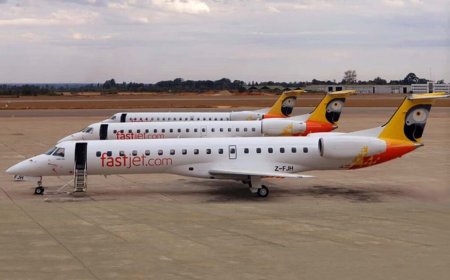Mozambique’s National Airline Retreats Further as $20 Million in Losses Ends International Routes
Mozambique’s national carrier, Linhas Aéreas de Moçambique (LAM), has announced the suspension of its Maputo–Cape Town route, effective from April 8, leaving the airline with only one remaining international connection — to Johannesburg, South Africa. The move follows the failure of its Maputo–Lisbon route, which generated losses of over $20 million, effectively ending LAM’s ambitions of becoming a regional or international player in the aviation sector.

The airline's management states that the latest decision forms part of a broader business restructuring plan aimed at consolidating domestic operations and focusing resources on its only viable international service. However, the operational reality paints a bleaker picture. As with the Maputo–Lisbon route, the Cape Town line proved financially unsustainable outside the peak tourism season, with flights often operating at extremely low occupancy.
Internal sources quoted by TORRE.News confirmed that while the route saw limited profitability during the South African summer months, for most of the year it was a drain on resources. “The operation was only profitable during a short window. For the rest of the year, it was effectively subsidised by the airline, worsening its financial vulnerability,” the source noted.
Compounding the challenges is LAM’s ageing and limited fleet, which has forced the company to rely on aircraft leasing arrangements — often under conditions that fail to generate sufficient returns. This dependency, combined with poor financial performance, has led to a string of route closures, including Maputo–Lisbon, Maputo–Harare, and Maputo–Lusaka.
LAM’s international retreat highlights the disconnect between its historic ambitions and the economic and logistical constraints it faces. The airline, once promoted by political leaders as a symbol of national revival, is now limited to a regional footprint centred on Johannesburg.
The Mozambican government has intervened in an attempt to stabilise the airline, transferring ownership stakes to state-owned companies such as Portos e Caminhos de Ferro de Moçambique, Hidroeléctrica de Cahora Bassa, and EMOSE.
LAM’s downward trajectory occurs at a time when Mozambique is seeking to position itself as a hub for natural gas development and international investment. Efficient air transport links are crucial to these ambitions, yet the national airline’s performance undermines broader economic goals.
With LAM now confined to a single international route, the long-promised transformation of Mozambique’s aviation sector appears increasingly out of reach — leaving a critical gap in regional connectivity at a time when integration with African and global markets is more important than ever.





















